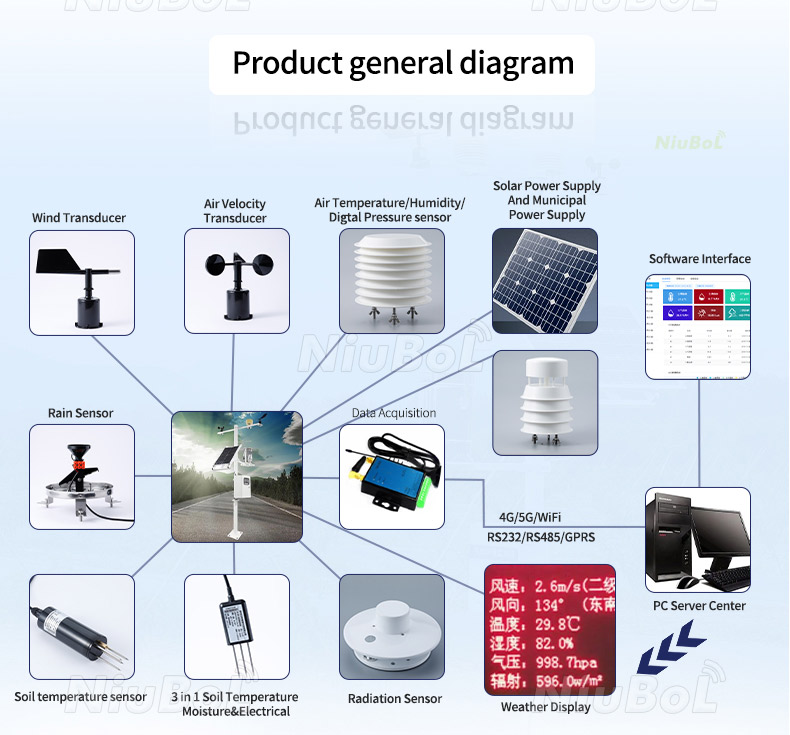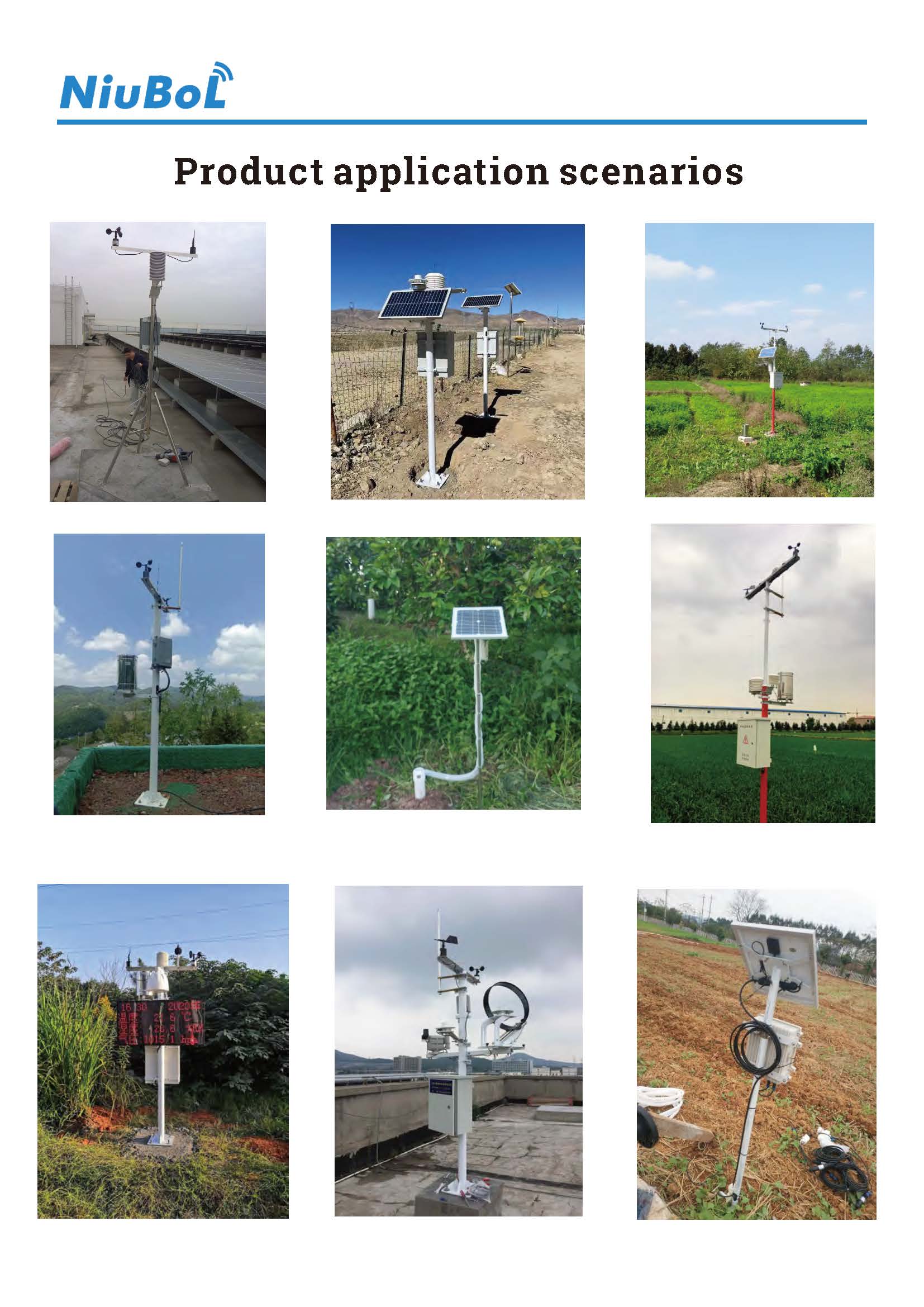

— Blogs —
—Products—
 Consumer hotline +8618073152920
Consumer hotline +8618073152920 WhatsApp:+8615367865107
Address:Room 102, District D, Houhu Industrial Park, Yuelu District, Changsha City, Hunan Province, China
Product knowledge
Time:2024-08-30 11:39:00 Popularity:900
A meteorological station (Weather Station) is a system that integrates a variety of sensors to monitor and record environmental meteorological data in real time. These data include, but are not limited to, ambient temperature and humidity, dew point temperature, wind speed, wind direction, barometric pressure, solar radiation, snow depth, rainfall, light levels, soil temperature, soil moisture, etc. Weather stations can be classified into various types based on usage, installation and accuracy, such as portable weather stations, high precision weather stations, highway weather stations, forest fire weather stations, campus weather stations, etc.
Weather stations provide data support for weather forecasting, climate research, environmental protection and professional meteorological services in various industries. The following are the specific functions of weather stations:
Equipped with advanced sensors and instrumentation, the weather station is capable of real-time monitoring and recording various key meteorological elements in the atmosphere, including temperature, humidity, air pressure, wind speed and direction, precipitation, sunshine duration, etc., as well as soil moisture, temperature and other agriculture-related parameters.
The collected data are accurately processed and calibrated to ensure the accuracy and reliability of the data, providing a solid foundation for subsequent analyses and applications.
Based on the data collected by weather stations, meteorologists are able to analyse weather patterns, predict future weather changes and issue weather forecasts.
When extreme weather events (e.g. storms, floods, droughts, etc.) are about to occur, the weather station is able to issue timely warnings to provide the public and relevant departments with emergency countermeasures to reduce the loss of life and property.
Weather stations provide detailed environmental data, such as soil moisture and temperature, for the agricultural sector, helping farmers to make scientific farming plans for irrigation, sowing, fertiliser application, etc., and improving crop yield and management efficiency.
The data accumulated by meteorological stations over a long period of time is an important resource for climate research and scientific exploration, helping scientists to gain a deeper understanding of the physical processes of the atmosphere, the mechanism of climate change, and the formation and development patterns of weather events.

Through the statistics and analysis of multi-year meteorological observation data, the data from meteorological stations can reveal the cyclical changes and long-term trends of the climate, providing key support for the validation and prediction of climate models.
Meteorological stations not only monitor meteorological elements, but also pay attention to the quality of the atmospheric environment, such as monitoring air quality, ultraviolet radiation, particulate pollution, etc., to provide a scientific basis for the formulation of environmental protection policies and public health.
In many industrial and civil applications such as energy management, traffic planning, outdoor activities arrangement, etc., the meteorological information provided by weather stations plays an important role in ensuring the safety of operations, improving efficiency and meeting the needs of the public in their daily lives.
Most of the modern weather stations are equipped with automation and unattended capability, which can operate stably for a long time in harsh environments. Through intelligent control system and remote monitoring function, users can grasp the working status and data of the weather station in real time to achieve efficient management.

To sum up, meteorological station is the core facility of meteorological observation and service, which plays a vital role in human production and life, scientific research, climate change response and so on. With the development of technology, modern weather stations have been automated and intelligent, real-time transmission of data and remote monitoring through wireless networks, which significantly improves the efficiency and response speed of data collection. The multifunctional characteristics of meteorological stations provide key meteorological information and services for weather forecasting, climate research, environmental protection, disaster warning and various social and economic activities.
Related recommendations
Sensors & Weather Stations Catalog
Agriculture Sensors and Weather Stations Catalog-NiuBoL.pdf
Weather Stations Catalog-NiuBoL.pdf
Related products
 Combined air temperature and relative humidity sensor
Combined air temperature and relative humidity sensor Soil Moisture Temperature sensor for irrigation
Soil Moisture Temperature sensor for irrigation Soil pH sensor RS485 soil Testing instrument soil ph meter for agriculture
Soil pH sensor RS485 soil Testing instrument soil ph meter for agriculture Wind Speed sensor Output Modbus/RS485/Analog/0-5V/4-20mA
Wind Speed sensor Output Modbus/RS485/Analog/0-5V/4-20mA Tipping bucket rain gauge for weather monitoring auto rainfall sensor RS485/Outdoor/stainless steel
Tipping bucket rain gauge for weather monitoring auto rainfall sensor RS485/Outdoor/stainless steel Pyranometer Solar Radiation Sensor 4-20mA/RS485
Pyranometer Solar Radiation Sensor 4-20mA/RS485
Screenshot, WhatsApp to identify the QR code
WhatsApp number:+8615367865107
(Click on WhatsApp to copy and add friends)